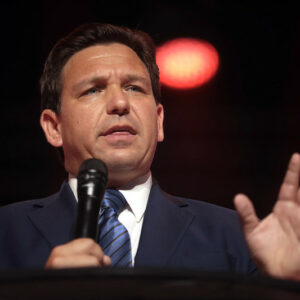Florida Governor and presidential hopeful Ron DeSantis seems torn on Ukraine. Answering a mid-March questionnaire from Fox’s Tucker Carlson, DeSantis, perhaps seeking to protect his political flank from isolationist rivals, declared that supporting Ukraine doesn’t serve America’s “vital national interests.” But the governor hardened his stance somewhat in an interview last week following backlash from parts of the GOP.
Amid the political maneuvering, where DeSantis truly stands on the Russia-Ukraine war remains unclear. He may simply lack firm views on the issue. As the presidential race heats up, DeSantis will have ample opportunity to rethink the arguments he made to Carlson. A more careful analysis will demonstrate that helping Ukraine defeat Russia’s unprovoked invasion isn’t just the right thing to do — it’s also a prudent investment in American security.
In his answer to Carlson, himself a staunch critic of American aid for Kyiv, DeSantis unleashed a litany of criticisms against current U.S. policy. Most importantly, the governor argued that supporting Ukraine in its “territorial dispute” with Russia “distracts from our country’s most pressing challenges.” They include, in his words, “securing our borders, addressing the crisis of readiness within our military, achieving energy security and independence, and checking the economic, cultural, and military power of the Chinese Communist Party.”
Those are all worthy goals, to be sure. Fortunately, Washington need not choose between them and aiding Ukraine. In fact, supporting Ukraine advances arguably the most important objective on the governor’s list: Checking China’s imperialistic ambitions.
As President Ronald Reagan observed: “History teaches that wars begin when governments believe the price of aggression is cheap. To keep the peace, we and our allies must be strong enough to convince any potential aggressor that war could bring no benefit, only disaster.”
Beijing is no doubt watching the conflict in Ukraine to gauge how the West would respond to a potential invasion of Taiwan. If Moscow can outlast Western will, China’s Xi Jinping may conclude he would face only fleeting consequences if he invades Taiwan. That conflict would destabilize the global economy and threaten a direct clash between China and the United States.
By contrast, if America and other free nations can help Ukraine to defeat Moscow’s unprovoked invasion, Beijing might think twice before attempting to take a bite out of its smaller neighbor. In short, deterring Chinese aggression starts with supporting Ukraine.
DeSantis further complained Washington has given Ukraine a “blank check,” demanding no “accountability” for how taxpayer dollars are spent. That assertion is simply false.
The United States, in partnership with Kyiv, has established a robust monitoring process to ensure American aid is used as intended. “To date, no significant acts of fraud or misuse involving U.S. assistance have occurred,” concluded House Foreign Affairs Committee Chairman Michael McCaul, a Republican, upon returning from a February trip to Ukraine.
Far from wasting U.S. assistance, Ukraine has put it to good use. Weapons provided by Washington and other Western nations helped Ukrainian forces repel the Russian assault on Kyiv and then liberate large swathes of territory in the country’s east and south. Ukraine is now looking to build on that successful track record with a major counteroffensive this spring.
As a bonus, Ukrainian forces will continue to deplete the Russian military, kneecapping America’s second-greatest adversary for years to come and helping deter potential Russian aggression against NATO. Not bad, considering that U.S. military aid for Ukraine to date amounts to around 4 percent of last year’s defense budget.
Yet rather than continuing with this smart investment, DeSantis said a “peace” settlement “should be the objective.” The implication is that by cutting assistance for Ukraine, Washington can force Kyiv to engage Moscow in peace negotiations.
All can agree that a just peace is preferable to war. But there is one small problem: Putin has shown no sign he is genuinely ready for peace. On Tuesday, the Kremlin reiterated that it currently sees no alternative to “military means” absent a Ukrainian capitulation.
Rather than achieving peace, pushing Kyiv into premature talks would likely prolong the war. Putin would no doubt interpret it as a sign that American resolve is flagging, reinforcing his belief that he can outlast the West. Meanwhile, Russia would cynically exploit any lull in fighting to replenish its forces for a follow-on offensive.
Instead of pulling the rug out from under Kyiv, the United States and its allies should ensure Ukraine has everything it needs to defeat Russian aggression as quickly as possible. That includes things like ATACMS missiles, which DeSantis—like the White House’s current occupant—opposes sending to Kyiv.
Ukrainians are not asking America to fight for them. They are simply asking for the weapons they need to defend their homes. By reprising its role as the “Arsenal of Democracy,” the United States is ultimately investing in its own security. DeSantis would do well to remember this fact—and then explain it to the American people on the campaign trail.


